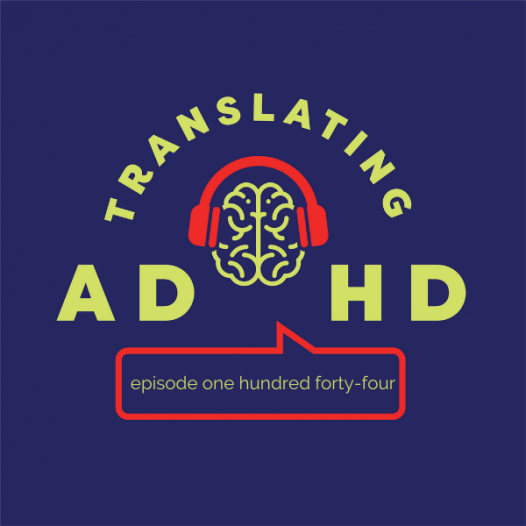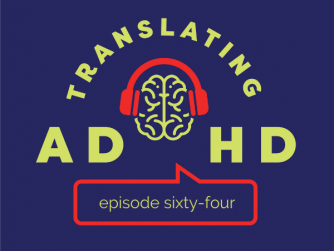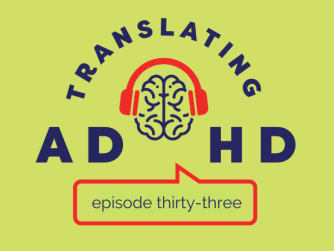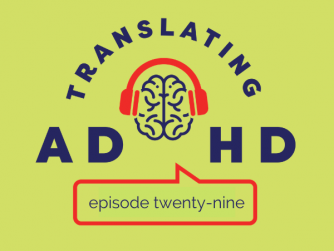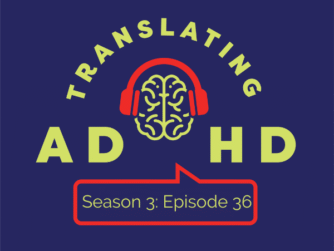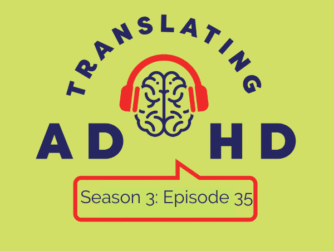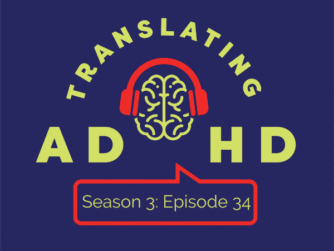The show pivots this week to explore race and culture and how they both inform one’s own lived experience. Shelly and Cam welcome fellow ADHD coach and diversity, equity and inclusion (DEI) advocate Sudhita Kasturi to the show. Similar to the show’s PoC Voices series, the hosts delve into the South Asian-ADHD experience with Sudhita as their guide.
Sudhita shares her own story of growing up in India with undiagnosed ADHD – the challenges she faced and the surprising sources of support and understanding. The conversation moves from Sudhita’s own story and eventual ADHD diagnosis to supporting her own children and finally to a discussion about the broader South Asian ADHD lived experience. Sudhita relays how her community is often viewed as a ‘model minority’ and the challenges those with ADHD are presented with. She also addresses the challenges of being a woman of color living in the United States.
Eventually the discussion moves to resources and resilience as Sudhita discusses next steps for the South Asian ADHD population. Fast moving, informative and entertaining from start to finish, all listeners will enjoy this conversation into ‘your context matters’.
Episode links + resources:
The links to the resources Sudhita shares in this episode:
- ADDA Virtual South Asian Peer Support Group. https://add.org/south-asians-adhd-peer-support-group/
- Sudhita’s website.https://www.leverageyouradhd.com/
- Sudhita’s email sudhita@leverageyouradhd.com
For more of the Translating ADHD podcast:
- Episode Transcripts: visit TranslatingADHD.com and click on the episode
- Follow us on Twitter: @TranslatingADHD
- Visit the Website: TranslatingADHD.com
Episode Transcript:
[00:00:00] Shelly: Hi, I’m Shelly [00:00:01] Cam: I’m Cam. [00:00:02] Shelly: and this is Translating ADHD. For this next segment on the topic of your context matters, Cam and I were really interested in looking at race and culture because as coaches, when we work with clients of varying cultural and racial backgrounds, we see how that context comes up and has an impact in our coaching work.However, this is outside of our lived experience. We are definitely two white Americans with a pretty similar lived experience as relates to race and culture both. So we’re trying something new. For the next few episodes, we’re bringing someone else in with a lived experience different than Cam’s and mine, and we’re not doing it interview style.
We’re inviting them to be part of the discussion. So we’ll see how this goes, but we’re really excited to bring you these episodes and we’re really excited about today’s guest. Cam, you wanna let our listeners know who’s joining the discussion with us today?
[00:01:08] Cam: Sudhita Kasturi is joining us. Sudhita is a fellow ADHD coach. She is a former student of mine and she is of South Asian descent. [00:01:20] Shelly: Cam, I think it’s also notable that Sudhita runs a South Asian support group for people with adhd. So she really has an interesting take on the intersection of ADHD and her culture.So Sudhita, let’s start there and let’s start with your own story where your story with ADHD and your culture begins wherever that might be.
[00:01:49] Sudhita: Hi Cam. Hi Shelly. It’s so awesome to be here. My journey, Well, I have an interesting background. I was born in the United. Raised in India and then I moved back to the United States for grad school. So I’ve kind of experienced both cultures and having ADHD in both cultures. Growing up of course, you know, nobody knew I had ADHD.All I knew that I was always very different and how I learned how I interacted with people. this experience of school was very different for me. And up through eighth grade, from kindergarten through eighth grade, I was in the same school with a fabulous group of friends who kind of supported my ADHD. And my mom worked with me a lot, and now what I recognize as body doubling, but I didn’t know that at that point, But she’d sit with me while I was studying and that would anchor my attention. Then I moved schools in high school. I went to two different high schools and the experience was not the same.
I didn’t have the support of my friends, that executive function piece, you know, So that was 14 and kind of on and off for almost about eight to 10 years. I struggled academically and I had ha high aspirations. Both of my parents are in academia, so I wanted to get a PhD. And the undiagnosed ADHD definitely got in the way of that.
So that’s kind of the early aspect of things and it really took till about 24, 25 for me to. Get my bearings with what I was doing. I got married and having a supportive husband who could coach me without knowing that he was coaching me helped me through really pushed me forward in my journey with ADHD. I was still undiagnosed, but I had a better handle on things.
[00:03:37] Shelly: Sudhita, as we were talking prior to recording the episode, I think your story gets really interesting from here because you were diagnosed later in life, kind of at the same age I was around age 30.However, some of the things we’re gonna talk about next you didn’t realize until much later in life in terms of the impact of ADHD itself and the impact of being a minority with adhd. So tell us more about sort of your discovery of those impacts and what you were noticing, because it seems like that’s what put you on this path to doing the work with the clients that you are working with today.
[00:04:19] Sudhita: Yeah, absolutely. I kind of discovered I had ADHD quite by accident. I was exhibiting now what I understand as all the classic symptoms of ADHD overwhelm, but the initial diagnosis that I had was something much more serious. So when all the tests were run and done, we found out that I had inattentive, adhd.Yeah. So for a lot of people, that comes with a lot of sadness, but compared to what my alternative diagnosis was, we had a huge celebration that it was only adhd.
[00:04:54] Shelly: So Sudhita, I’d like you to share what they were looking into as far as what they thought the diagnosis might be for you, because this is a really unique experience to be diagnosed late in life and to be celebrating this diagnosis.Among all of my clients at any stage when they’re diagnosed, a celebration is usually not what happened. So I think it’s helpful to share exactly what the alternative was there. If you don’t mind.
[00:05:21] Sudhita: Yeah, absolutely. So the interesting part for me was they said that they suspected a tumor in my brain. So I was going through neurological testing, MRIs, all of that. And part of that testing was a neuropsych evaluation. And I remember spending two days in the psychologist office doing all these tests and not quite knowing what the purpose was.But you know, going through the whole gamut of testing. And in the end when we went back to the neurologist for our diagnosis, And expecting that there was gonna be surgery or whatever else. The worst case scenario was that they said, Oh, it’s all good. You actually have inattentive, adhd. And I remember my husband and I sitting there not even being able to grasp, like it would not register because we had something else in our head based on what they had told us.
And then I think the neurologist said something to the effect of, This is good news. I mean, this is really good. And I didn’t know what ADHD was. no medication was offered to me at that point of time. I got my report. I went home. I looked at it. It took a little bit for it to sink in. I shared the report with my mom who said it completely reflected my childhood and all my struggles, but it really didn’t sink in until I started seeing some of the same challenges with my children, because I think I’d compensated well.
I had a good support structure at home. With friends. So when I saw it with my kids, I’m like, Oh my gosh. it is genetic, so we need to look into this.
[00:06:56] Shelly: Yeah, and it didn’t sink in. Is unlike most of us, this was really good news. You don’t have a tumor, you just have adhd, and this is something that you were aware of your whole life to some degree because of the support that you were receiving at home. So being able to share that with your mom and have her say, Yeah, that is accurate to who you are. [00:07:19] Sudhita: Absolutely. It was a celebration. I remember getting out of the doctor’s office and calling my best friend because she was on standby to come help us in case I needed to go into surgery. And you know, she was like, okay, like I guess there’s no surgery. And we’re like, yeah, we don’t exactly know what having ADHD means, but it’s no surgery and it’s something that we can manage. And I believe they said vitamin B or something like that was gonna help my focus. And to keep my stress levels low, which all seemed like good things to do anyway. And so that was that. So, yeah, it was huge. And that just, didn’t sink in. I didn’t look at it, so I just kept doing what I was doing. [00:07:59] Cam: Well, this also, brings us back to this whole your context matters piece, right? Because, so I was diagnosed about 25 years ago. But see, I was a teacher, right? And as teachers we saw ADHD in the classroom. We had, again, in services and learning about first hyperactive and impulsive ADHD. And it was these typically boys who couldn’t sit still. And much later it was girls and inattentive, but it was sort of on our radar a bit. Right, because this is where we saw the performance impact. And I think probably with your kids too, but how much was it, you said, you didn’t even know about ADHD, and I just wonder how much of that is part of South Asian heritage. It’s not even on the radar of the community at that. [00:08:53] Sudhita: That’s an interesting question. Growing up, I had never heard of it until that point when it was given to me on a piece of paper. Right. And I went to all girls school up through 10th grade and high school. The last two years of my high school was a co-ed school. College was co-ed. But I don’t ever remember seeing these boys that everybody talks about, the hyperactive boys or whatever. I do remember all through continuously, always hearing that I was very smart and very intelligent and I had high potential, or I had great potential or whatever, but I never measured up to that potential and nobody. Knew why, and a lot of times it was like, Oh, if she just worked harder. I did actually work really hard, but that was, about all I could do I was doing the best I could and obviously it was not good enough in terms of, my academics. [00:09:48] Shelly: I talk about this a lot when I speak on ADHD, particularly when I’m speaking to non-ADHD audiences. If you just turned in your work on time, if you just tried harder, if you just applied yourself. So your and my experiences are very similar there, because that was my childhood as well. Right. Smart, but lazy. [00:10:09] Cam: Mine too. Yeah, mine too. Shelly. [00:10:11] Shelly: Yeah, [00:10:12] Sudhita: Yeah, I had that word lazy label when I was growing up. and I just didn’t know how to do any better than I was already doing, and it was not because of a lack of desire or a lack of effort, or I just had a different brain that I didn’t know about and nobody else around you about none of my teachers knew about, right? There was just a higher expectation that I could not. [00:10:39] Shelly: Yeah, and much to the confusion of the people around you because of your intellect. [00:10:44] Sudhita: Yes. And my parents were really supportive, right? And I have two neurotypical sisters, so there was no answer there. And my parent, who we believe has ADHD is really high achieving. So then I was the anomaly in all of this of. Why could I not be high achieving like everybody else around me? Because obviously I have the smarts to do it. [00:11:10] Shelly: And I wanna point out, you were the anomaly and you were also in a bit of an anomaly in terms of your family because while they didn’t know how to help you, in some ways they were supportive. And they were standing behind you in this, rather than trying to push you in ways that did not work for you. So now let’s kind of jump to the point of when you did start to understand how ADHD was impacting you.So here even with a diagnosis, other than reflecting back on childhood and saying, Well, okay, now my childhood makes a little more sense. You kind of picked up and moved on for a while. So talk to us about when you really started to notice the impact and what, what you were noticing and why.
[00:11:56] Sudhita: So it’s interesting for one thing I loved trying new things, so different careers, different opportunities. But once I figured it out, it got really boring. That usually came about the time that they were about to promote me to something else where it was like, Ooh, that’s awesome. Thank you. But I’m bored.Right? And I chose to be a stay at home mom, and then we decided to homeschool our children. And that was a little bit of a struggle for me to homeschool and have that structure. Well, kind of the whole parenting structure was a little bit of a mystery to me because I had all these people telling me that their kids woke up as a certain time. They had lunch exactly at a certain time. Dinner was at a certain time. Who does that?
[00:12:41] Cam: Who does that [00:12:43] Shelly: not my household. I can tell you that much. [00:12:46] Sudhita: I remember when my second child was born, he needed, he has a high metabolism, he needed to eat like every 90 minutes, small portions, but 90 minutes. And my older son and I would be homeschooling and we’d forget.So we started putting timers after he would eat, we’d put a timer on the microwave or somewhere that said 90 minutes. So it would break our focus because we’d both be in, sometimes if we’re in that hyper focus mode, we’d forget about ourselves, forget about anybody else in the house, and we’d go and feed him
So he wouldn’t get cranky because our body needs, were very different from his. So these are the interesting thing. I have never heard that from another parent that they had to put a timer. To feed their child. But this whole structure, fixed times was not there. It was actually when I started homeschooling my kids and I started teaching science.
I developed an integrated science class to teach my son, and then ended up having a lot of my friends who were interested in being in that class with my son, and it became something I did in the homeschool community. and it integrated chemistry, biology, physics and geology. So you kind of ov it and didn’t teach it as sopi subjects.
It was a lot of fun and I stopped teaching it about the time where I figured out all the ins and outs of that program, and then I paused for about five years before I picked it back up again, and it became new again. To me it was not boring anymore. But while I was homeschooling and I also ran summer camp for a nonprofit program, and that’s when I realized that there were things that I just wasn’t very good at.
Fortunately, I have a whole team full of people who also volunteer, who have skill sets that are complimentary to mine, and they could do a lot of the stuff. That I couldn’t. So as a team, we succeeded year after year doing this because we all brought our best to that and brought different strengths to that.
[00:14:43] Cam: Yeah, so at this time then there’s a pivot here, Sudhita. Right around this recognition of this dilemma, but then converting it into an opportunity. And tell us a little bit about this the path toward ADHD coaching. [00:14:56] Sudhita: Yeah, absolutely. So both my kids got diagnosed at the same time and then began the quest for offering support to them. And we had a really tough time finding good coaches for my kids and you know, we were willing to pay, but we still couldn’t find the support that we needed. And our clinical psychologist actually kind of threw out the idea to me was, have you considered becoming an ADHD coach? And I looked into it and I, there was all this information on the web that was very hard for me to wade through. It actually was not ADHD friendly. And in 2020, in the middle of the pandemic and I was also busy homeschooling, teaching, running this camp on a volunteer basis.So my calendar was fairly full. And in 2020 I attended the CHADD. And there was an opportunity to meet with some of the speakers there. And I met with Joyce Kubic before the conference started. So she kind of helped set the stage for what I was gonna hear over the next three days. And by the time I came out of there, it all the pieces fell together.
What our clinical psychologist had suggested, our own struggle, finding good coaches and this knowledge base and the community that I. Felt at home with it was because there were all these people, a lot of ADHD coaches have ADHD themselves. So I felt very much at home. And that was, I think in less than a month I was signed up for the program.
And in January I was in your class cam. So that was where my journey with you began, which has been fabulous. So, that was the basis of why I became a coach. For, and it’s really helped, It’s helped with my kids have their own coaches. I am not their coach well my older one does, but it has really helped us understand ADHD and looking back on my journey of how that ADHD but it against race, culture, and expectations in the larger society of who we are.
[00:16:58] Cam: Yeah. And so can we pivot in that direction and can you speak to that of the challenge that’s unique to South Asian? [00:17:06] Sudhita: Absolutely. So you know, here we are, people of color, right? Could be female, male, gender is there. Definitely that piece is there. Also, then we have adhd. This is the thing. South Asians, were considered a model minority. So there’s an expectation of perfection, some standard of excellence.When you have ADHD, it’s very difficult to meet that standard of excellence to meet that expectation. So there’s a lot of questioning within yourself, and there’s a lot. How you show up in society doesn’t really work for whatever image people have in the western world of how an Asian or a South Asian is supposed to show up.
[00:17:51] Cam: But those, those expectations are both external to your culture. And also internal. And can you speak to the internal, just again, some of the pressures that you can feel inside of the South Asian community? [00:18:04] Sudhita: Yeah, absolutely. As far as I can remember, I’ve been an extremely outspoken person, an extremely direct person. Very passionate about a lot of things and there just was, didn’t seem to be a space for me. With all of that, over time, I’ve carved out my space some places where I’ve learned to not speak up as directly and you know, kind of package what I was saying.And those are really difficult when you have ADHD because the executive function, the kind of all that processing that’s involved in showing up a certain way, which may not be your natural way, can be very difficult to do. Again, though, I have had a very close group of friends, family who were okay with me being the way I was, and again, my team that I work that value, and there have been people in my life who valued me for what I am. That passion, being direct, being outspoken, all of that. And so that has led to a lot of joy instead of a lot of unhappiness.
[00:19:12] Shelly: Sudhita, when you first said that language of model minority, Wow that’s really powerful language and. This idea of within the culture, you’re expected to show up a certain way. I imagine also intersects with being a woman and how women are expected to show up in western society differently than men as far as being outspoken and opinionated.So just wanted to call out how these things weave together, right? And all have an impact. So, The fortunate thing for you is you did have a lot of support, even with the ways that you showed up differently. So now tell us about your clients and the work that you do. Why this work? Why are you so passionate about this?
Or what do you see in your client experiences that’s similar to what you went through or maybe different than what you went through? In terms of people who maybe didn’t have that close support group that maybe insulated you a little bit from some of these impacts.
[00:20:16] Sudhita: Absolutely. If I can actually say one thing when you said about how women show up, I remember somebody in my undergrad labeling me as being aggressive [00:20:24] Shelly: Mm mm-hmm. [00:20:25] Sudhita: and when I think back, I don’t believe I was aggressive. I’ve been ambitious always like you know, and competitive. , but not aggressive. But when you are direct and outspoken as a woman, that gets labeled negatively, while if it were a man, it would get labeled in probably, whatever a positive word, or it would probably be ambitious and goal oriented. [00:20:48] Shelly: Assertive, right? [00:20:50] Sudhita: Assertive, Right. Yeah, I remember that saying that, and I remember coming home and wondering about what I had done. That would get me this negative label of being aggressive. [00:21:02] Shelly: Wow. [00:21:02] Sudhita: So, when you said that, it just kind of popped in my head and I’m like, I remember that. Yeah.So my work, it’s really fabulous. As you mentioned, I co-lead the a South Asian peer support group. I was also invited onto the board of the ADHD coaches organization as a junior board member, and I’m now leading the DEI task force for the aco, which we’re about 20 coaches strong at this point of time.
[00:21:31] Shelly: And what is DEI for our listeners? [00:21:34] Sudhita: Diversity, equity and inclusivity. And 20 coaches from all different backgrounds, all colors, races all over the world, that we are looking to see how we can welcome more coaches of different backgrounds into the coaching world. And then my clients, I have all ages. I think the youngest I’ve coached is 13. The oldest is somewhere in their fifties. Female, male, all different races.Religions and lot of South Asians and the South Asian journey can be challenging because mental health diagnosis, like ADHD, they are not talked about in the community. There is no awareness. There’s this feeling of, yes, this is a temporary thing. They will grow out of it if they just worked hard enough and tried. And a lot of times people will not go and get the help that they need in terms of supports like the 5 0 4 s or IEPs because they do not want their children labeled a certain way. And so it’s interesting walking that path with my clients, seeing some of them are estranged from their families because of this absolute lack of understanding.
And like you said, I’ve been fortunate, I have. A supportive family who accepted me for who I am, versus a lot of people. There’s this mold that you’re supposed to fit into and they never did. With ADHD, you can’t. You will find your own way and find your own path that does not fit with the rest of the world.
[00:23:03] Shelly: How that mold back again to model minority just isn’t within the culture. It’s also within Western society. Others expect you to fit a certain mold. And Sudhita, I imagine that even with some of the ways that you were fortunate, having that cultural lived experience, being from the same or similar background a massive support to your clients. Just as having ADHD is a support because it shortcuts, understanding. There’s a level of understanding there that someone like Cam or I would have to get more context from a client to really understand what that might look like for them, whereas you have a bit of an implicit understanding. [00:23:50] Sudhita: Absolutely. And you know, every person’s situation is unique, so you are always still asking those questions. But yes, the basis of how our families work, how society. What, you know, what expectations parents have of their children, children have of their parents, all of that society has, communities have, whether they’re faith based, non-faith based, social, all of that. It helps when you start that conversation and they know that you understand. [00:24:18] Shelly: Which also speaks to why the work you’re doing with that DEI committee is so important because all of us as coaches, could stand to learn more. By way of learning more, do better by our clients in this shared experience of adhd, but also in all of the ways where experiences differ and the impacts that those have. [00:24:42] Cam: Shelly, one of the reasons I wanted to have Sudhita on was just the work she’s doing right in the face of the challenge. She could play a smaller thing. She could just do her clients, she could just focus on her kids. But she is seen an opportunity taking all of this challenge and converting it into learning and then sharing this learning.And so, Sudhita, you were saying earlier about how there can be um, inertia or right obstacles to educating your community and. You’re also in your community giving presentations on ADHD, right. And so I’m, really, I wanna take us out today with this, you know, like what powers Sudhita, right? What drives you to continue to educate and inform and to normalize the ADHD experience in the South Asian community.
[00:25:40] Sudhita: Lots of things. Most importantly, I think people may not struggle if they understand. there’s nothing wrong with them. They’re just different. And if we could increase awareness education about that, and that’s true for all communities, but definitely in the South Asian community. That’s one of my biggest motivations I’ve seen.I’ve struggled and I see a lot of, I have young adults that I coach. I have medical students that I coach and doctors who have made it through. They’re smart, they’re South Asian different communities, but most of them are South Asian that I coach. And it need not be that difficult if they could get the supports that they needed.
So what really motivates me is getting the word out people to understand coaching, how coaching is supportive of the ADHD journey, what amazing strides people can make by partnering with a coach. And until I went to the chat conference, I didn’t even know about ADHD coaching. I knew there was something called life coaching, but I didn’t even understand what that.
And my perception of what an ADHD coach or any coach does was very different. I remember that in our first day of your class, you looked at my face and said, You look very perplexed by our definition of coaching I signed up and I was in the class not quite knowing what coaching was, but I love it. So that’s basically my motivation.
I want it to be there to be a wider understanding of how mental health support is available. And if we avail of what we have around us, then, whatever that might be, we can all do better and live happier and joyous lives. And one other thing for me is that there’s a lot of ancient wisdom in the East that I have unknowingly leaned upon to aid my own ADHD journey and bringing that ancient knowledge to people to know that it’s there. We just have to call upon it or learn about it, and we can all have happier, more fulfilled, joyous lives with ADHD.
[00:27:50] Shelly: Wow, Sudhita, thank you for that. Cam and I started this podcast to help expose more ADHD people to the idea of ADHD coaching, because we saw what you see that so many people aren’t even aware that this way of working with their ADHD is available to them. And that spirituality piece is so interesting. It’s something that we talked about before starting recording, and so listeners, coming back to your context matters with spirituality is something that we’re hoping to do. And if we are able to work that in, certainly we’d love to have you back to delve into that ancient wisdom, how you’re using it yourself, how it’s applying in your work with your clients.So at this point of the show, I would normally tell our listeners how they could support Cam and my work here on the podcast, but today I would rather tell them how they can support you. So, Sudhita, if there’s one thing that our listeners can do to support your work, what would that be?
[00:28:49] Sudhita: Well, one thing for the South Asians out there. there is a support group that they can join. And that’s a great community we have where we can all share ideas and think about, how we can support each other’s journey. [00:29:03] Shelly: Okay, and we can link that one in the show notes. [00:29:05] Sudhita: And then as for my work, I guess first of all, a higher awareness of coaching within the South Asian community. And for mental health resources and to reach out if they’re seeing something that does not seem to fit with their family members, children, adults, whoever it is, go find out what it is. There’s so many curated resources out there, and this is ADHD Awareness month, so there are a lot more resources out there. So find out what it is and see get the support and help you need. It’s better to know then not to know, and once you know there’s so many options for how to get help. [00:29:44] Shelly: Thank you. So a call to action to our South Asian listeners who may not have yet pursued answers, and I also hear a call to action in there. If anyone listening would benefit from Sudhita’s knowledge in the workplace or anywhere else, her contact information will be in the show notes. So if this is a topic that it would benefit you to bring to your group, this is what Sudhita’s area of expertise is. [00:30:11] Cam: So Sudhita, thank you so much for coming today. Shelly and I have just thoroughly enjoyed this so. And thanks for kicking off this foray into race and culture and your context matters. So again, thanks so much. [00:30:24] Sudhita: Well, thank you for having me. I have been listening to your podcast for a long time because when we found out were teaching that you hosted the podcast. It was a great way to supplement my education and I have continued to do so. So I enjoy listening to both of you and it’s absolutely wonderful to be on here.When I started my ADHD coach journey, while I was listening to those podcast thinking, oh, one of these days I’m gonna be on that podcast. So I really appreciate this. This has been a wonderful conversation. Thank you so much.
[00:30:54] Shelly: Thank you for being here. So next week we’re gonna continue this topic with another guest, and until then, I’m Shelly, [00:31:01] Cam: And I’m Cam. [00:31:02] Shelly: and this was the Translating ADHD podcast. Thanks for listening.
